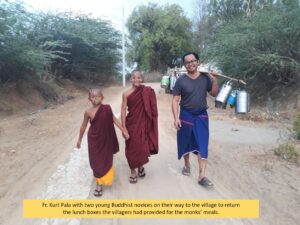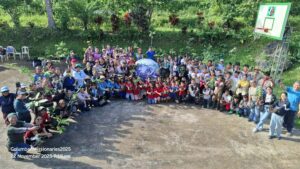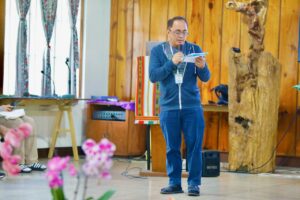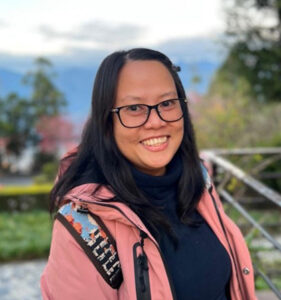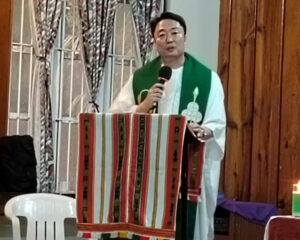By Fr. Kurt Pala, SSC
“Wa alaikum wa salaam! Eid Mubarak!” Mufti Irfaan greeted me back. This day is Eid al-Fitr. Eid al-Fitr is a festival celebrated by Muslims worldwide because it marks the end of the month-long dawn-to-sunset fasting of Ramadan. This is the third Eid that I had visited him and his family. Today they offered me some traditional Burmese sweets and the popular Eid snack called “samay” which is a warm sweet snack with coconut meat and the Sa-Nwin-Ma-Kin which is a semolina pudding.
Mufti Irfaan is an Islamic scholar and lawyer. He runs a language center where he teaches English and Arabic to many students. That day I met some of his students who also wanted to speak English with me. So, I engaged with them and spoke with them. They were asking me how long I had lived in Myanmar and if I could speak Burmese. I replied in my broken Burmese. And they commented that I spoke Kachin with their teacher, Mufti Irfaan.
Mufti Irfaan is a Kachin by blood from Sumprabum, one of the remote Kachin hills. His family converted to Islam. It is very rare to find Kachins who have converted and are practicing Muslims. Most of his relatives are still Catholics. His grandmother is a regular church goer in the parish where I used to serve and so I often see her and also meet Irfaan when he comes to visit his grandmother. Sadly, his grandmother passed away just a month before Ramadan.
He went overseas to complete his Islamic studies. He is a master of the Arabic language and the Quran. Mufti Irfaan’s house and center is located in Rambo Quarter where most of the Muslim families of Myitkyina live and work. In Myitkyina, like many cities, people often congregate and live together based on their religion or social status.
As I entered this part of the city, one can sense the joy in the people along the streets and the houses. Children visit houses and families and would be given some sweets or money. Irfaan said that most kids would refuse the sweets and snacks and prefer money instead. “Times are changing,” he added.
Mariam, Mufti Irfaan’s little child is sweet and very intelligent. She speaks Burmese, Kachin, English, and of course, Arabic. I mentioned to Mufti Irfaan the new document Al-Mizan, a covenant for the Earth, which was released recently by Muslim scholars to address the climate crisis. He took out his English-Arabic Quran and showed me the text used in the new Muslim document on care for the environment.
“The Most Merciful, Taught the Quran. Created Humankind. Taught him Eloquence. The sun and the moon move in precise calculation and the stars and the trees prostrate and the heaven He raised and imposed the balance (Mizan). That you not transgress within the balance (Mizan) and establish weight in justice and do not make deficient the balance (Mizan)” – Quran 55:1-9
He asked Mariam to recite the text from memory. Mariam recited smoothly the text without looking at the Quran. In Islam, the term Al-Mizan refers to balance or justice, and it is often used to describe the equilibrium that should be maintained in all aspects of life, including the relationship between humanity and the environment. After a few more minutes of conversation in Kachin, more and more people started coming to see him and the family, so I told him that I had to leave and thanked him for the welcome. I told him that we will meet again soon to discuss more ways we can work together.
Myitkyina is an example of how Myanmar is diverse in terms of cultures and faith traditions. Here you can find temples, monasteries, masjids and churches. Interreligious or interfaith dialogue for social cohesion is an important ministry that we Columbans can animate and work with the local community. We are looking forward to working with the network of interfaith youth and women in the coming months.
Myanmar continues to experience war and conflict, but it is important to continue to work for social cohesion and peace-building to keep things in balance.



